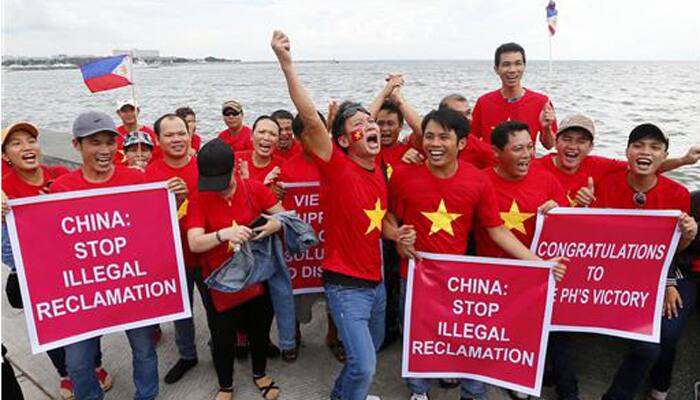The Hague/Beijing/Delhi: Reacting to a UN-backed tribunal striking down China's claims of 'historical rights' in the strategic South China Sea, India on Tuesday said that all parties must show respect for the ruling.
"India supports freedom of navigation and over flight and unimpeded commerce, based on principles of international law, as reflected notably in UNCLOS. India believes that states should resolve disputes through peaceful means without threat or use of force and exercise self-restraint in the conduct of activities that could complicate or escalate disputes affecting peace and stability," a statement by the Ministry of External Affairs stated.
It added, "Sea lanes of communication passing through the South China Sea are critical for peace, stability, prosperity and development. India urges all parties to show utmost respect for the UNCLOS."
Our statement on the Award of Arbitral Tribunal on South China Sea Under Annexure VII of UNCLOS pic.twitter.com/T5FBdUPAAj
— Vikas Swarup (@MEAIndia) July 12, 2016
The ruling by the tribunal triggered an angry response from Chinese President Xi Jinping who vowed not to accept it "under any circumstances".
Xi's strong remarks came immediately after The Hague-based tribunal backed a case brought by the Philippines and dismissed the core of China's claims over the 90 percent South China Sea (SCS), ruling that "there was no legal basis for China to claim historic rights within the sea areas falling within the 'nine-dash line'", which is based on a Chinese map dating back to the 1940s.
China claims almost all of the South China Sea, including reefs and islands also claimed by others.
The tribunal in The Hague said China had violated the Philippines' sovereign rights. It also said China had caused "severe harm to the coral reef environment" by building artificial islands, as per PTI.
The Philippines has had diplomatic spats with China over the Scarborough Shoal and Spratlys in particular.
During a meeting with European Council President Donald Tusk and European Commission President Jean-Claude Juncker, President Xi, also the General Secretary of the ruling Communist party and commander-in-chief of the military, said China's territorial sovereignty and maritime interests in SCS will not be affected by the ruling under any circumstances.
Xi's comments indicates China's tough stand on the ruling by the five judge tribunal appointed by the Permanent Court of Arbitration which struck down Beijing's controversial nine- dash line on the SCS claiming over 90 per cent of the area.
China "neither accepts nor recognises" the ruling of the tribunal in the SCS arbitration established at the request of the Philippines, the Chinese Foreign Ministry said in Beijing.
"The award is null and void and has no binding force," it said in a statement minutes after the tribunal delivered its judgement striking down Beijing's claims of historic rights over the area, strongly disputed by the Philippines, Vietnam, Malaysia, Brunei and Taiwan.
China's territorial sovereignty and maritime rights and interests in the SCS shall under no circumstances be affected by those awards. China opposes and will never accept any claim or action based on those awards, the statement quoted by state-run Xinhua new agency said.
The tribunal concluded that "to the extent China had historic rights to resources in the waters of the SCS, such rights were extinguished to the extent they were incompatible with the exclusive economic zones provided for in the Convention" (UN Convention on the Law of Seas), it said.
"The tribunal also noted that, although Chinese navigators and fishermen, as well as those of other States, had historically made use of the islands in the SCS, there was no evidence that China had historically exercised exclusive control over the waters or their resources," it said.
For decades China, which boycotted the tribunal questioning its legality has been asserting that its emperors have discovered the islands hundreds years ago and have been exercising control over the area throughout the history.
But its claims came into conflict with the Philippines, Vietnam, Malaysia, Brunei and Taiwan as they hardly have exclusive economic zones (EEZ) provided by UNCLOS which Beijing declined to recognise.
While the Philippines filed the case in 2013, Beijing's claims over the SCS are also contested by Vietnam, Malaysia, Brunei, Taiwan and Indonesia as well.
Ahead of the ruling, the US had asked China to learn from India's handling of its maritime disputes with neighbours.
In 2014, the same court that gave verdict on the SCS ruled against India in favour of Bangladesh in a three-decade- old maritime dispute. To India's great credit, it accepted the decision and has abide by it.
As the concerns over the verdict rose here, specially its international impact, the Chinese military which is building its installations on the artificial islands asserted that it will "resolutely protect" Beijing's sovereignty over the area, where the US navy has made big inroads.
Yang Yujun, spokesman for the Ministry of National Defence, said that Chinese military will resolutely protect the country's national sovereignty, security and maritime rights and interests, and will address threats and challenges.
"The position of the Chinese government on the SCS arbitration initiated by the Philippines is consistent and clear," Yang said, stressing that Chinese military will resolutely protect its national sovereignty, security and maritime rights and interests; safeguard regional peace and stability; and cope with all kinds of threats and challenges.
Responding to questions on the Chinese navy's recent drills in the SCS, Yang said that the drill was a routine matter in line with the military's annual exercise plan.
Yang said that the drill, seen as a muscle flexing by China ahead of the tribunal verdict, targeted potential situations at sea and was a live-fire test to boost the navy's capabilities to fulfil missions.
Hours before the tribunal delivered its verdict, Foreign Ministry spokesman Lu Kang said China will not even officially receive the judgment of the tribunal as it has no legal basis.
Lu warned that China will resort to "solemn response" against anyone challenging its stand.
(With PTI inputs)

















